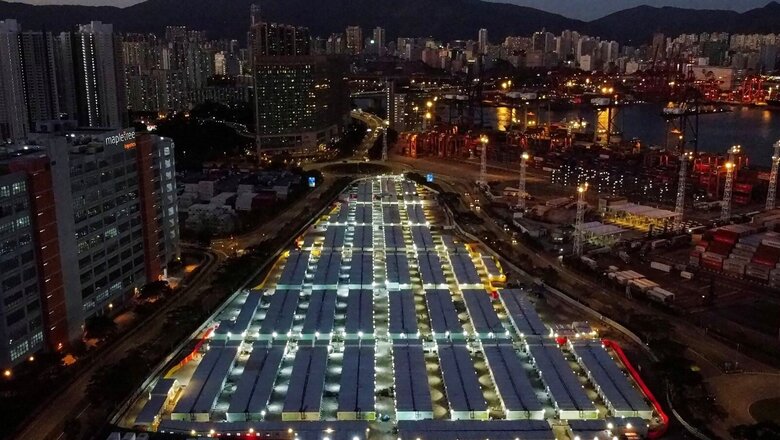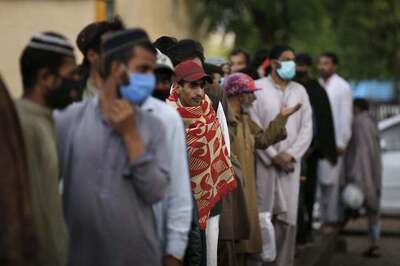
views
Hong Kong has grown increasingly dependent on China’s Covid-19 strategy of pushing for zero cases, versus opening to the world as other countries have done. This, experts say, has helped Beijing seep its presence evermore into the city, in a way previously unimaginable.
Since early this politically-sensitive year for China, Hong Kong has seen a rise in cases and death rates. According to a report by Reuters, some government advisers in Beijing fear that unless Hong Kong contains the virus, the city will revert to the instability that plagued the city in 2019, when anti-government protests posed a major crisis for Chinese President Xi Jinping.
And Hong Kong has leaned into it. In late February, the city declared an emergency ordinance in order to “draw on the mainland’s support” and “undertake key anti-epidemic projects at full speed,” according to a press release.
Elderly patients are now being cared for by mainland Chinese doctors and nurses at a treatment facility set up in the massive AsiaWorld-Expo convention centre. The medical staff were able to avoid licencing exams and registration procedures that are normally required for staff who are not trained locally under the emergency laws, said a report by the Hong Kong Free Press. Authorities stated that computers used to record patient information had been converted from English to Chinese in order to accommodate them.
A report by Bloomberg published in late February also details how Beijing is using the outbreak to increase its surveillance over and inside Hong Kong. Key behind this is an intrusive contact-tracing app, a step authorities had resisted even after using a Beijing-imposed national security law to imprison key democracy activists.
Hong Kong chief executive Carrie Lam called it ‘killing two birds with one stone’.
“The outbreak serves as a window of opportunity to introduce whatever China means by its ‘dynamic zero strategy’ to Hong Kong,” Kenneth Chan, associate professor specialising in Hong Kong politics at Hong Kong Baptist University told Bloomberg.
“The ‘patriots only’ leaders in government and the legislature are eager to transplant what they see as the mainland approach to show how it works in Hong Kong, though none of them were able to tell and inform citizens here what exactly they have in mind,” he said.
Since China imposed the national security law on Hong Kong in June 2020, authorities have attempted to prosecute approximately journalists, activists, and pro-democracy lawmakers, among others. Increased digital surveillance will now provide officials with more tools to access information on citizens’ whereabouts, the report said.
But how will that happen?
Under the vaccine pass mandate, which requires a person to venues where a positive case is found are required to upload customers’ data on to a government server. The data would then be used to locate customers who had visited the venue during a specific time period.
“The venue operator won’t be able to read the personal data, but the government can,” David Webb, activist investor and founder of Webb-Site.com told Bloomberg. “It could then see, for example, that you (a journalist) arrived at a restaurant at almost the same time as X (a source).”
Beijing’s Motive?
An analysis of China’s Covid-19 countenance in Hong Kong published by the Reuters in late February talks about how Xi Jinping is determined to not let a possible outbreak become a window for ‘political instability’ in a politically sensitive year for him. (Xi is set to be reelected this year.)
Xi told the city that its “overriding mission” was to control the worsening crisis back in February, and Hong Kong subsequently stepped up its anti-COVID measures, including plans for mass testing backed up by mainland equipment, testing vehicles, and personnel.
Lau Siu-kai, a Chinese government adviser, told Reuters that Beijing recognises that there are still a lot of anti-government, anti-China forces in Hong Kong that may be waiting for an opportunity to return.
Lau, who is deputy director of the Association of Hong Kong and Macau Studies, a top think tank directly under China’s Hong Kong and Macau Affairs Office, said, if the epidemic spread from Hong Kong to the mainland, particularly Guangdong, it would become a national security issue for the central government.
Apart from China’s Communist Party preparing to hold its five-yearly Congress, where Xi is expected to secure an unprecedented third term, the year also marks the 25th anniversary of Britain’s handover of Hong Kong to Chinese rule, and Xi would normally be expected to attend anniversary celebrations.
China also wants to show the success of it’s zero-Covid policy against the West’s approach, even though it is hard to implement in Hong Kong with its cramped living quarters in high-rise buildings and a population that can be resistant when it comes to complying with government orders.
“It’s been a battle since the Wuhan outbreak, to show the supremacy of China’s governance over the West in controlling the virus,” Reuters quoted a person with ties to senior Chinese officials overseeing Hong Kong affairs as saying.
A Chasm Closes Further
Lynette Ong, a political science professor at the University of Toronto told the Hong Kong Press that “Beijing has been trying to mould Hong Kong into another (Chinese) city” with the “the Covid crisis giving them a legitimate reason to do so.”
Apart from the usual Covid equipment, the city has also put into use a traditional Chinese medication, Lianhua Qingwen. The medication, which has been registered with the city’s pharmaceutical board, has been flagged by health authorities in Singapore and the United States for making unsubstantiated claims in its advertising.
Another threat outlined by the Hong Kong press in its report is the construction China is undertaking in Hong Kong to make Covid centres. Apart from the construction of a Covid-19 hospital in Lok Ma Chau, mainland China has already helped Hong Kong build five other isolation facilities for patients with mild or no symptoms.
In Hong Kong, infrastructure projects typically involve construction firms submitting bids to compete for billion-dollar contracts. However, all facilities being built with mainland assistance have been turned over to Chinese State Construction Engineering, a state-owned company, explains Hillary Leung in her report.
There is also a cultural shift that can be witnessed. Leung details how when top Hong Kong officials stood at attention during the opening ceremony for the newest centre in the northern district of Yuen Long, a video of toiling construction workers, portrayed as worked-to-the-bone heroes, played before them. In the background, a song in Mandarin, rather than the Cantonese language spoken in Hong Kong, played, she writes.
Read all the Latest News , Breaking News , watch Top Videos and Live TV here.


















Comments
0 comment